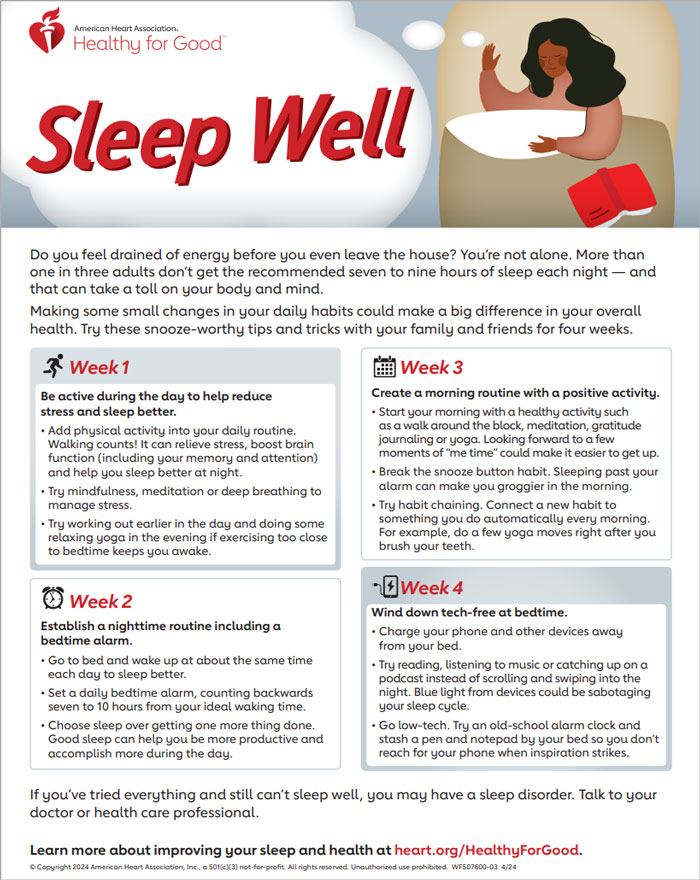Sleep Well Infographic
Do you feel drained of energy before you even leave the house? You’re not alone. One in three adults don't get the recommended seven to nine hours of sleep each night — and that can take a toll on your body and mind.
Challenge yourself to make some small changes in your daily habits that could make a big difference in your overall health. Try these snooze-worthy tips and tricks with your family and friends for four weeks.
Week 1
Be active during the day to help reduce stress and sleep better.
- Add physical activity into your daily routine. Walking counts! It can relieve stress, boost brain function (including your memory and attention) and help you sleep better at night.
- Try mindfulness, meditation or deep breathing to manage stress.
- Try working out earlier in the day and doing some relaxing yoga in the evening if exercising too close to bedtime keeps you awake.
Week 2
Establish a nighttime routine including a bedtime alarm.
- Go to bed and wake up at about the same time each day to sleep better.
- Set a daily bedtime alarm, counting backward seven to 10 hours from your ideal waking time.
- Choose sleep over getting one more thing done. Good sleep can help you be more productive and accomplish more during the day.
Week 3
Create a morning routine with a positive activity.
- Start your morning with a healthy activity such as a walk around the block, meditation, gratitude journaling or yoga. Looking forward to a few moments of “me time” could make it easier to get up.
- Break the snooze button habit. Sleeping past your alarm can make you groggier in the morning.
- Try habit chaining. Connect a new habit to something you do automatically every morning. For example, do a few yoga moves right after you brush your teeth.
Week 4
Wind down tech-free at bedtime.
- Charge your phone and other devices away from your bed.
- Try reading, listening to music or catching up on a podcast instead of scrolling and swiping into the night. Blue light from devices could be sabotaging your sleep cycle.
- Go low-tech. Try an old-school alarm clock and stash a pen and notepad by your bed so you don’t reach for your phone when inspiration strikes.
If you’ve tried everything and still can’t sleep well, you may have a sleep disorder. Talk to your doctor or health care professional.
Explore Related Content
- Is Sleeping In on Weekends Good for Your Health?
- Life's Essential 8 - How to Get Healthy Sleep Fact Sheet
- Sleep Disorders and Heart Health
- Sleep Better With Healthy Lifestyle Habits
- 5 Steps to Lose Weight and Keep It Off
- Getting Active
- Habit Coach: Healthy Habit Video Series
- Working Out to Relieve Stress

